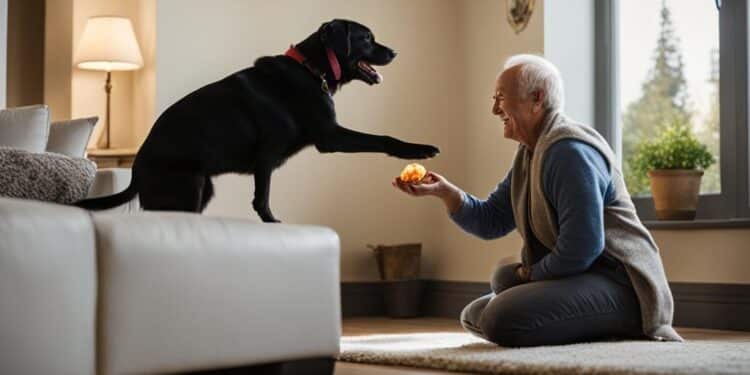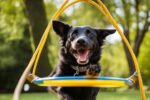Old Dogs, New Tricks: Training Tips for Older Canines

Training older dogs requires a unique approach that takes into account their changing needs and capabilities. Senior dog training is essential to ensure their mental sharpness and maintain a strong bond with their owners. In this article, we will explore effective techniques and strategies to adapt to the age of your furry companion.
As dogs age, they may face certain challenges that can impact their ability to learn and respond to training. Physical limitations and cognitive changes can pose obstacles, but with understanding and adaptation, successful training is still possible.
Effective training techniques for senior dogs can make a significant difference in their ability to learn and retain new commands. Positive reinforcement, patience, and short training sessions are key elements. Additionally, incorporating cognitive enrichment activities can provide mental stimulation and keep their minds sharp.
Training older dogs requires recognition of their unique needs and capabilities, implementation of effective techniques, and the provision of cognitive enrichment. By following these tips, you can help your senior dogs thrive and continue to learn throughout their lives. Remember, it’s never too late to teach an old dog new tricks!
Understanding the Challenges of Training Older Dogs
When it comes to training older dogs, it’s important to recognize the unique challenges they may face. Physical limitations can greatly impact their ability to learn and respond to commands. Common issues such as arthritis or reduced mobility can make it difficult for them to perform certain exercises and movements. As a result, training sessions may need to be modified to accommodate their physical needs and ensure their safety.
In addition to physical limitations, cognitive changes can also affect older dogs’ responsiveness to training. Decreased hearing or vision can make it harder for them to understand verbal cues or see visual signals. These changes require trainers to adapt their methods and find alternative ways to communicate with their senior dogs.
Understanding and addressing these challenges is crucial for successful training. It’s essential to approach training older dogs with patience, compassion, and flexibility. By adapting techniques and exercises to their physical and cognitive abilities, trainers can create a positive and rewarding training experience for their beloved senior canines.
Physical Limitations in Older Dogs
Older dogs may experience a range of physical limitations that can impact their training. Here are some common issues to consider:
- Arthritis: Joint pain and stiffness can make it difficult for older dogs to perform certain movements.
- Reduced mobility: Loss of strength and flexibility can limit their ability to participate in complex exercises.
- Sensitivity to touch: Some older dogs may have increased sensitivity to touch due to age-related conditions like neuropathy.
Cognitive Changes in Older Dogs
The cognitive changes that come with age can affect a dog’s ability to learn and respond to training. Here are a few examples:
- Decreased hearing: Older dogs may have difficulty hearing verbal cues or commands.
- Reduced vision: Vision impairments can make it challenging for them to see visual signals or cues.
- Memory decline: Senior dogs may struggle with retaining information and remembering previously learned commands.
Adapting Training Techniques
Adapting training techniques to accommodate older dogs’ challenges is key to their success. Consider the following strategies:
- Use clear, consistent signals: Opt for simple hand signals or gestures that are easy for your dog to see and understand.
- Modify exercises: Adjust exercises to be low-impact and gentle on their joints, focusing on mobility and flexibility.
- Give extra time: Allow older dogs more time to process commands and respond, as their cognitive functions may be slower.
- Provide mental stimulation: Incorporate puzzle toys or scent games to keep their minds engaged and prevent mental decline.
| Challenge | Impact | Adaptation |
|---|---|---|
| Physical Limitations | Difficulty performing certain movements | Modify exercises to be gentle and low-impact |
| Cognitive Changes | Reduced responsiveness and comprehension | Use clear signals and provide extra time for understanding |
Effective Training Techniques for Senior Dogs
Training older dogs requires a tailored approach that takes into account their unique needs and capabilities. By using effective training techniques, you can help senior dogs learn and retain new commands, strengthening the bond between you and your furry companion. Here are some proven techniques for training older dogs:
1. Positive Reinforcement
Positive reinforcement is a highly effective training technique for senior dogs. By rewarding desired behaviors with treats, verbal praise, or gentle pats, you can motivate your older dog to learn and engage in training sessions. This positive association helps them understand what behaviors are expected of them and encourages them to repeat those behaviors in the future.
2. Patience is Key
Older dogs may take longer to process and respond to commands compared to younger dogs. It’s important to be patient during training sessions and avoid rushing your senior dog. Give them extra time to understand and execute commands, and always maintain a calm and encouraging tone. Remember, training should be a positive experience for both you and your dog.
3. Short Training Sessions
Due to their age and potential physical limitations, older dogs may tire more quickly during training sessions. To prevent mental and physical fatigue, it’s best to keep training sessions short and focused. Aim for sessions lasting around 5-10 minutes, several times a day. This approach allows for better concentration and helps your senior dog stay engaged and motivated.
4. Cognitive Enrichment Activities
Incorporating cognitive enrichment activities into your senior dog’s training routine can provide mental stimulation and keep their minds sharp. Puzzle toys, interactive games, and scent work are great examples of cognitive enrichment activities that engage their senses and promote problem-solving skills. These activities not only enhance their cognitive abilities but also add variety and excitement to their training sessions.
| Training Technique | Benefits |
|---|---|
| Positive Reinforcement | – Motivates senior dogs to learn – Establishes clear expectations – Encourages desired behaviors |
| Patience is Key | – Helps senior dogs process commands – Creates a positive training environment – Builds trust and confidence |
| Short Training Sessions | – Prevents mental and physical fatigue – Increases focus and engagement – Allows for better retention of commands |
| Cognitive Enrichment Activities | – Provides mental stimulation – Promotes problem-solving skills – Adds variety to training sessions |
By implementing these effective training techniques and considering the unique needs of senior dogs, you can create a positive and rewarding training experience. Remember to be patient and adapt your approach to accommodate any physical limitations. With the right techniques and plenty of love and encouragement, your senior dog can continue to learn and thrive.
Conclusion
Training older dogs requires understanding and adaptation to their unique needs and capabilities. As dogs age, their physical and cognitive abilities change, necessitating a different approach to training. By recognizing the challenges they may face, owners can implement effective training techniques and provide cognitive enrichment to help their senior dogs thrive and continue to learn throughout their lives.
One of the key aspects of training older dogs is recognizing and addressing the physical limitations they may have. Arthritis or reduced mobility can make certain training exercises challenging. Modifying exercises to accommodate their needs and incorporating low-impact activities can help maintain their physical well-being while allowing them to learn new commands.
Additionally, understanding the cognitive changes that come with age is crucial for successful training. Older dogs may experience decreased hearing or vision, which can affect their responsiveness. By using positive reinforcement, being patient, and breaking training sessions into shorter intervals, owners can give their senior dogs the time and support they need to process and respond to commands effectively.
Furthermore, providing cognitive enrichment activities is essential for keeping older dogs mentally stimulated and engaged. Puzzle toys, scent games, and other interactive activities can help maintain their cognitive function and prevent mental fatigue during training sessions.
In conclusion, training older dogs requires a tailored approach that considers their unique needs and challenges. By understanding their limitations, implementing effective training techniques, and providing cognitive enrichment, owners can help their senior dogs continue to learn and thrive. Remember, it’s never too late to teach an old dog new tricks!
FAQ
What challenges do older dogs face that can affect their ability to learn and respond to training?
Older dogs may face physical limitations such as arthritis or reduced mobility, as well as cognitive changes like decreased hearing or vision, which can impact their responsiveness to training.
What training techniques are effective for senior dogs?
Positive reinforcement techniques, such as using treats and verbal praise, are particularly effective in motivating older dogs. Patience is key, as it may take them longer to process and respond to commands. Shorter training sessions, ranging from 5-10 minutes, can help prevent mental and physical fatigue. Additionally, incorporating cognitive enrichment activities such as puzzle toys or scent games can provide mental stimulation.
How long should training sessions be for older dogs?
Training sessions for older dogs should typically range from 5-10 minutes to prevent mental and physical fatigue.
How can cognitive enrichment activities benefit older dogs?
Cognitive enrichment activities, such as puzzle toys or scent games, can provide mental stimulation and help keep older dogs’ minds sharp. These activities can also contribute to their overall well-being and happiness.






